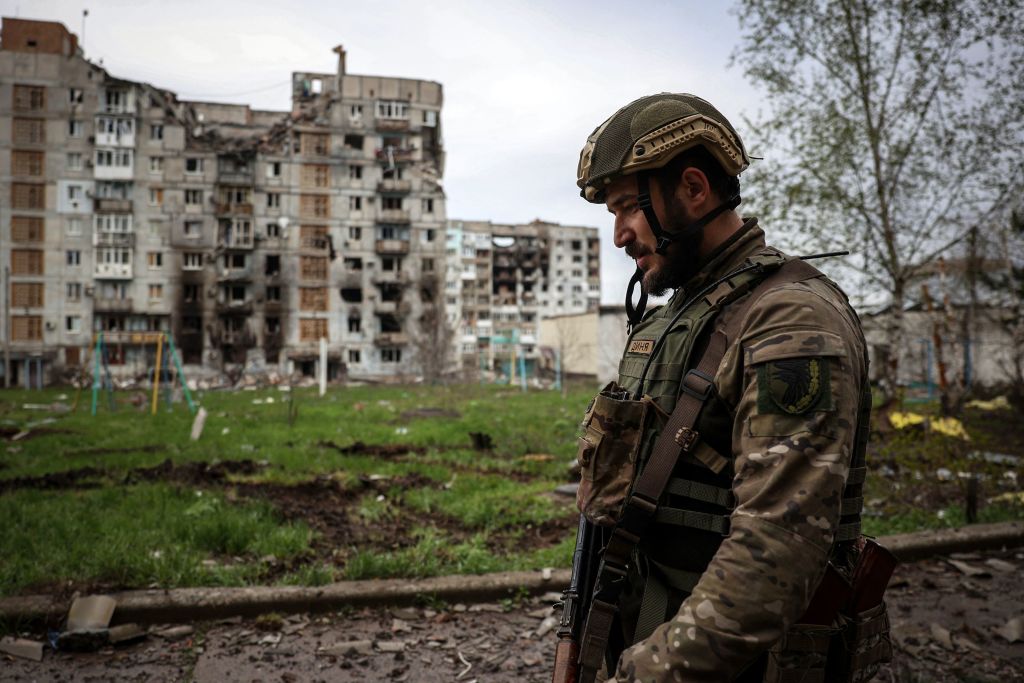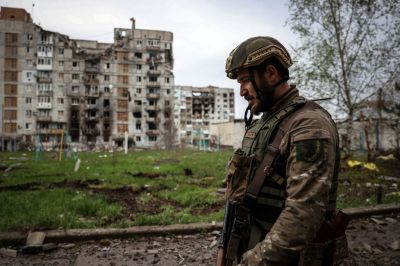Russian and Ukrainian forces continued their yearlong battle over Bakhmut this week in southeast Ukraine. But the now-destroyed city has also become the theater for another struggle between Russia’s military leaders and the mercenaries Moscow sent to the front to bolster its conventional forces last year: the Wagner Group.
After a series of small counterattacks in and around the city by Ukrainian forces this week, the Russian Ministry of Defense claimed Wednesday that its reinforcements had made incremental gains near Bakhmut. But Wagner’s commander, Yevgeny Prigozhin, on Thursday accused the Russian military of pulling back and leaving his own units exposed. As the fight for the city rages on, the two Russian forces are both hoping to take credit for victories while deflecting blame for defeats.
On Monday, new revelations from the Discord leaks—classified material shared online by a 21-year-old Massachusetts Air National Guard airman this year—revealed just how far Wagner’s infamous oligarch leader would go to that end. First reported by the Washington Post, the U.S. intelligence documents detailed January communications between Ukraine’s military intelligence directorate and Prigozhin, who allegedly offered to give up Russian troop positions in exchange for the Ukrainian military’s retreat from Bakhmut. Unwilling to relinquish the city and doubting the sincerity of the offer, which Prigozhin reportedly made on more than one occasion, Ukraine declined.
Russian officials dismissed the story as a “hoax,” yet it’s one in a string of reports signaling the divide between Russia’s defense ministry and Prigozhin’s guns-for-hire. Earlier this month, the Wagner chief threatened to withdraw his forces from Bakhmut if Russian commanders didn’t provide his forces with more ammunition. “The blood is still fresh,” he said in a video posted to Telegram, gesturing to corpses he claimed belonged to his fighters. “They came here as volunteers and are dying so you can sit like fat cats in your luxury offices.” When the military failed to meet Prigozhin’s demands, threatening him instead with treason charges, he remained on the front line.
Prigozhin may have backed himself into a corner in Bakhmut, experts say. “Despite his threats, despite his claims that he’s going to withdraw and recoup, he needs this victory,” said Kateryna Stepanenko, a Russia analyst with the Institute for the Study of War. “As long as Prigozhin is on the frontline, I don’t think that the Kremlin is going to go after him. And that’s why Prigozhin didn’t follow through with his blackmail, despite his conditions not being met.”
The battle that now holds Prigozhin hostage was once his ticket to political power. The fight for Bakhmut began in May 2022, around the time when Russian President Vladimir Putin began to run out of combat-ready reserve forces. Faced with the choice between calling up another unpopular draft or turning to mercenary fighters, Putin opted for the latter, relying on Wagner to supplement the costly war effort. Prigozhin, in turn, was able to grow his army by recruiting in prisons and exploit his direct access to the Kremlin, bypassing the chain of command within the defense ministry.
But it didn’t take long for Prigozhin to come up against personnel shortages, suffering huge losses amid offensive wave after offensive wave using untrained ex-convicts. Of the 50,000 he had recruited from prisons (it’s unclear how many operatives he had before the war in Ukraine), just 10,000 remained, human rights organization Russia Behind Bars estimated in January. Prigozhin has since brought in more elite forces, but the battle for Bakhmut continues, as Ukraine and Russia pour resources into costly urban warfare operations. To Prigozhin, Russia’s top military commanders—namely Defense Minister Sergei Shoigu and the military’s chief of staff, Gen. Valery Gerasimov—are to blame for his failure to take the city. And in the tug-of-war for influence over the Kremlin, their failures are his successes.
Prigozhin’s reported contact with Ukrainian intelligence, if true, is a “symptom of his ongoing feud with the Russian Ministry of Defense and his efforts to undermine them in any possible way, so that he can regain favor with Putin,” Stepanenko said in an interview. “He uses the Russian Ministry of Defense’s failures to his advantage to promote a narrative that the Russian conventional forces aren’t capable of achieving any decisive impact on the battlefield.”
The defense ministry, meanwhile, has shored up its own allies in Moscow against the Wagner Group. The mercenaries were barred from recruiting in prisons in February, and one member of the Russian State Duma’s defense committee recently deemed Wagner an “illegal” force and proposed punishing military draftees who join the group with up to 15 years in prison.
And Prigozhin’s rivals aren’t limited to Russia’s military establishment. Chechen warlord Ramzan Kadyrov, who once referred to Prigozhin as his “brother,” offered this month to replace Wagner on the battlefield with his own Akhmat forces. His bid was apparently rejected.
Igor Girkin, an influential former Russian general and ultranationalist blogger, has also come after Prigozhin—most recently hurling antisemitic insults at him for his Jewish ancestry. “Who is Prigozhin, tell me? Is he Russian? No. He is not a Russian person. He is not Russian even by nationality,” he said in a video recording, comparing the Wagner chief to participants of the Bolshevik uprising. “The majority were Jews.” But Girkin also attacks top Russian commanders—this week calling Gerasimov and Shoigu “moral freaks and complete slackers”—epitomizing the complicated web of competing interests playing out in Moscow.
According to Ivana Stradner, a Russia expert with the Foundation for the Defense of Democracies, these disputes are likely to continue surfacing as long as Russia experiences setbacks in Ukraine. “This is just the beginning,” she said. “The more Russia loses, the more we are going to see rifts between different security structures inside Russia.”
But despite rebuking Putin as a “happy grandfather” in one of his recent Bakhmut rants, Prigozhin has largely escaped the Russian president’s wrath. Some Kremlin watchers, Girkin included, think it’s because the Wagner Group serves Putin’s interests by acting as a counterweight to the defense ministry.
To the Ukrainian military, though, all of the competing factions represent the same thing: an enemy invasion of sovereign territory.
“What kind of games they’re playing are none of our concern. What we are concerned about is making sure that by not trusting them, we stay alert, we stay fit, and we stay prepared. And it’s showing on the battlefield,” Yuriy Sak, an adviser to Ukraine’s defense minister, told The Dispatch. “They’re not giving up on Bakhmut, but neither have we. We are seeing some weaknesses, some openings, and we are going for them.”






Please note that we at The Dispatch hold ourselves, our work, and our commenters to a higher standard than other places on the internet. We welcome comments that foster genuine debate or discussion—including comments critical of us or our work—but responses that include ad hominem attacks on fellow Dispatch members or are intended to stoke fear and anger may be moderated.
With your membership, you only have the ability to comment on The Morning Dispatch articles. Consider upgrading to join the conversation everywhere.